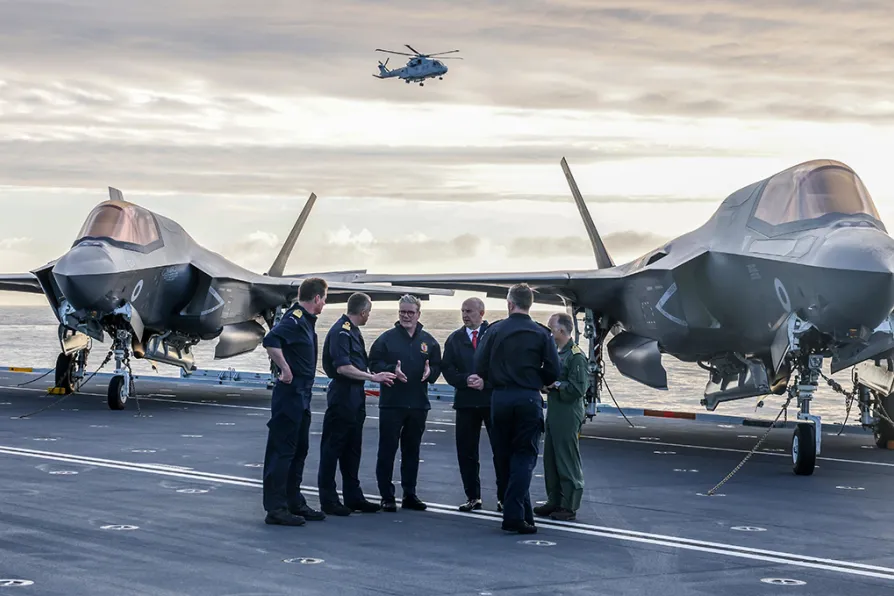
 Prime Minister Keir Starmer (third left) and Defence Secretary John Healy (third right) talk with naval officers on the flight deck of HMS Prince of Wales, the Royal Navy's flagship aircraft carrier, in Plymouth, Devon, April 24, 2025
Prime Minister Keir Starmer (third left) and Defence Secretary John Healy (third right) talk with naval officers on the flight deck of HMS Prince of Wales, the Royal Navy's flagship aircraft carrier, in Plymouth, Devon, April 24, 2025
OVER the weekend, statements by Prime Minister Keir Starmer and Defence Secretary John Healey have committed the government to levels of military expenditure that are the highest this century. The target by the next parliament is now 3 per cent. That’s a 40 per cent increase since the beginning of the decade, a level that will directly menace key areas of desperately needed social and infrastructure spending.
This comes ahead of the 2025 Nato summit later this month, where Starmer will seek to promote his leadership, and in the context of Britain’s 2025 Strategic Defence Review that has been in the making since summer 2024.
This “independent” Defence Review is intended to provide the small print detail of how Britain is to be transformed into a major military power, one with a permanent war economy and capabilities to intervene in the Atlantic, Eurasia and the Pacific. It describes Russia as “an immediate and present danger” and China as a “sophisticated and persistent challenge.” Already, Healey has announced £1.5 billion to build new weapons factories to manufacture rocket propellants, drones and electronic warfare equipment.
In combination, these policies are a direct challenge to the traditional values of the labour movement. Immediately, they threaten any promised government measures to address Britain’s crisis of economic and social decline, let alone any significant response to the climate emergency. Internationally, they increase, not diminish, the threat of world war.
Its proponents are very much aware of this challenge. The Defence Review foregrounds the need to transform attitudes, create a new pro-military “mindset” that can encompass all levels from schools to some new form of civilian-based defence mobilisation.
The authors are also aware of the need to sell these policies in the trade union movement. Rearmament, it argues, will create many new, well-paid jobs. Their academic supporters are already talking of a new “military Keynesianism.”
How can all this be challenged? One key document is the just-published Alternative Defence Review. A collective report, brought together by academic experts and leaders within Britain’s peace organisations, it provides factually-grounded research disputing the whole logic of the official report.
Will jacking up defence expenditure create employment? No, definitely not. Up to a third of military hardware is bought in from the US, and this is not likely to change any time soon. International estimates show that three existing jobs, in areas such as social care or health, will have to be cut to support two new jobs in defence. So a net loss of jobs.
Will this “military Keynesianism” rescue our wider economy? No. It will more likely kill it.
Keynes sought to overcome mass unemployment. Government intervention was to create new jobs and put more spending power into people’s pockets.
The problem today is that, in conditions of notional full employment, wages have declined in real terms, our welfare state fails to provide for many areas of social need and across the wider economy, investment has collapsed. Finance companies take the profits and no longer reinvest.
Healey’s hi-tech AI factories will get their technologies from the US tech giants — and it won’t be for free.
However, an even greater issue of political concern is where these new government policies come from. The Alternative Review exposes the scale of lobbying by defence companies and, still more worryingly, the long-term penetration by US agencies.
Who is the co-director of the government’s report? It is Fiona Hill, previously senior director for defence in the first Trump administration and a close associate of John Bolton, the man who, to use Trump’s own words, “has never seen a war he does not like.”
Such “defence” will not protect us. It directly heightens the risk of world war.










